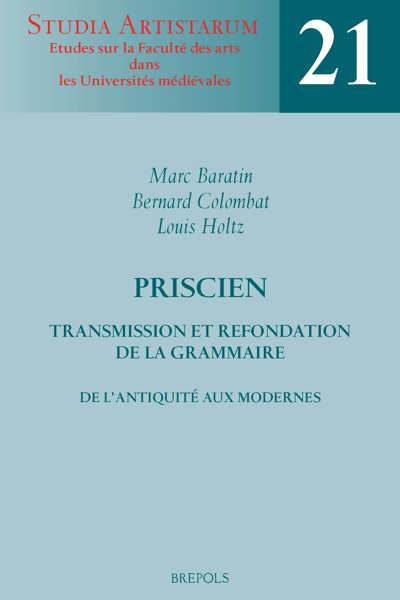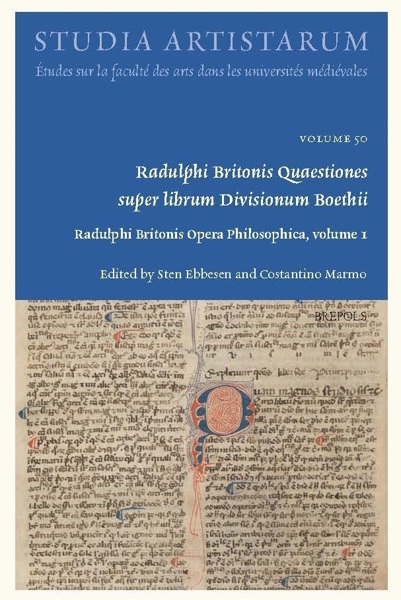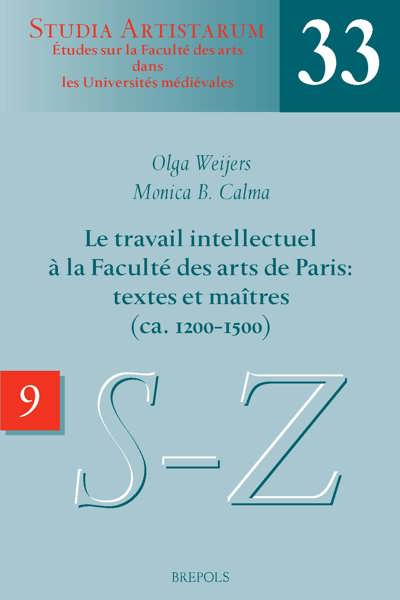
Radulphus Brito
Radulphi Britonis Quaestiones super librum Divisionum Boethii
Radulphi Britonis Opera Philosophica, vol. 1
Sten Ebbesen, Costantino Marmo (eds)
- Pages: 118 p.
- Size:156 x 234 mm
- Illustrations:2 tables b/w.
- Language(s):Latin, English
- Publication Year:2024
- € 75,00 EXCL. VAT RETAIL PRICE
- ISBN: 978-2-503-60703-0
- Hardback
- Available
- € 75,00 EXCL. VAT RETAIL PRICE
- ISBN: 978-2-503-60704-7
- E-book
- Available
The edition of Radulphus Brito’s Questions on Boethius’ Liber divisionum, in two different versions, opens the edition of the philosophical commentaries by Radulphus Brito, the last great Parisian Master of Arts.
Sten Ebbesen (*1946) is an emeritus professor at the University of Copenhagen and doctor h.c. at the universities of Gothenburg and Bologna. He is the author of more than 300 scholarly articles and books, most of them about medieval logic or editions of relevant texts. Modern research on Radulphus Brito’s logic and semantics was started in the 1970’s by Ebbesen’s teachers Heinrich Roos and Jan Pinborg, and he has continued their work.
Costantino Marmo (*1958) is full professor at the University of Bologna, where he teaches Semiotics and History of Semiotics. He is author of numerous articles and books in various languages about the history of medieval semiotics, logic, grammar and rhetoric, and about contemporary semantics and philosophy of language.
Boethius’ De divisione or Liber divisionum was the authoritative book on mereology in medieval scholasticism. Together with other Boethian works it formed part of the Ars vetus, the core of which was constituted by Porphyry’s Isagoge and Aristotle’s Categories and Peri hermeneias, but after c. 1250 the Boethian works were but rarely taught in university. One master who did do courses on De divisione was Radulphus Brito (c. 1270 – 1320/21), who taught in the Parisian Faculty of Arts in the 1290’s and possibly some years into the 1300’s after having become a student of theology about 1299.
Radulphus was an innovative thinker with a considerable impact on the philosophical debate in his lifetime, and he continued to be considered relevant till the end of the 15th century. He left a vast amount of writings, most of them from his days as a teacher of the arts. Among those preserved are quaestiones on the whole of the Ars vetus and Ars nova, Parva naturalia, Physics, De anima, Metaphysics and Ethics, as well as Priscianus minor.
Radulphus taught some courses more than once, and each time revised the text of his lectures, leaving us with two or more versions of the relevant questions. On De divisione there are even two completely different sets of questions, both of which are edited for the first time in the present volume. The introduction contains a detailed study of the way Brito’s question commentaries developed over time.




